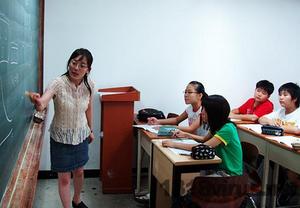Posted on : Oct.9,2006 15:22 KST
Modified on : Oct.10,2006 15:15 KST
Grade-level ability in English twice as high
South Korean elementary school students have a higher level of grade-level performance in the English language than they do their own, according to a report.
According to data on 2004 academic performance, submitted October 8 by the Ministry of Education and Human Resources to Rep. Lee Eun Young of the ruling Uri Party’s education committee, only 19.5 percent of sixth graders in elementary schools nationwide received a score of "excellent" in an assessment of their Korean abilities, while 46.6 percent scored "excellent" on a similar evaluation of their knowledge of English. The two tests evaluated levels of ability in each language equivalent to grade-level educational standards.
This means that the number of elementary students with grade-level excellency in English is more than double the number of children who hold high skills in Korean.
The percentage of students who lagged behind even basic scholastic ability in either language stood at 4.0 percent in Korean and 2.3 percent in English. Those at this level in Korean most likely cannot understand school lessons, the report said.
About 52.6 percent of the elementary students had "ordinary"-level ability in Korean and 23.9 percent held "basic" scholastic ability in Korean, as per the standards of their educational level. Nearly 50 percent held "excellent" grade-level ability in English, and 25.3 percent and 25.9 percent held "ordinary" and "basic" academic ability, respectively.
In 2002, the number of "excellent"-level students was 38.8 percent in English and 15.6 percent in Korean. In 2003, the gap narrowed a bit, with 22.8 percent scoring "excellent" in Korean and 33.1 percent in English. However, the data for 2004 shows that the gap again widened.
The report on overseas language course of the elementary and middle and high school students showed that for the first eight months of this year, 15,362 students left for foreign countries to take language courses, compared to a total of 15,181 during all of 2005.
Rep. Lee said, "If just a quarter of effort and cost of that invested in English learning were spent on education in the national language, such a situation wouldn’t have happened. It is urgent to prepare measures for further education on the national language. We shouldn’t consider Korean as just one of many subjects, or spend more time on English and mathematics than the national language."

